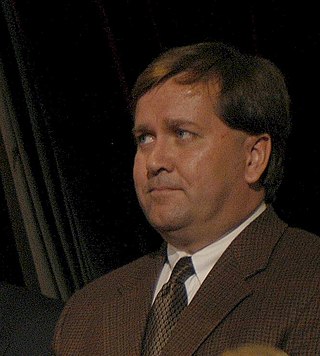Biography
Steele was born in Hutchinson, Kansas, and was raised in Kansas City, Missouri. He graduated from the University of Missouri–Kansas City and began his career at the Kansas City Times , where he covered politics, labor and urban affairs. In 1970 he joined The Philadelphia Inquirer, where his partnership with Barlett began.
Barlett and Steele were the longest-running investigative reporting team in American history and also the co-authors of nine books, including two New York Times bestsellers.
The duo's reporting methods included extensive use of government documents and computers to analyze complex public issues. The Washington Journalism Revue in 1990 described them as "almost certainly the best team in the history of investigative reporting." [1]
At The Inquirer from 1971 to 1997, Barlett and Steele tackled a wide range of subjects, including The Internal Revenue Service, the oil industry, American foreign aid, federal housing programs, criminal justice, nuclear waste, hidden tax breaks enacted by Congress, income inequality and the shrinking middle class.
For their series "Auditing the IRS", [2] which documented unequal patterns of tax collection, they were awarded The Pulitzer Prize for National Reporting in 1975. [3] They also received The Pulitzer Prize for National Reporting in 1989 [4] for their series "The Great Tax Giveaway", [5] which disclosed the identities of individuals and corporations that received preferential tax breaks in the Tax Reform Act of 1986.
In 1972, Barlett and Steele, working with Philip Meyer, who pioneered in the field of computer-assisted journalism, used a computer to analyze more than 1,000 cases of violent crime in Philadelphia. "Crime and Injustice" was the largest computer-assisted journalism project of its time. [6]
Their 1991 Inquirer series, "America: What Went Wrong?", on how actions of Wall Street and Washington were undermining the middle class and leading to ever-greater income inequality, was named one of the 100 greatest works of journalism of the 20th century [7] by New York University's School of Journalism. Bill Moyers produced and narrated two one-hour specials based on the series for "Listening to America" [8] on PBS.
In 1997, Barlett and Steele left The Inquirer to become editors-at-large for Time Inc., writing principally for Time magazine. Time won two National Magazine Awards for series by Barlett and Steele: "What Corporate Welfare Costs You" (1998) [9] and "Big Money and Politics: Who Gets Hurt" (2000). [10]
After Time, for financial reasons, [11] declined to renew their contract, Barlett and Steele became contributing editors for Vanity Fair. [11] From 2006 to 2016, they researched and wrote investigative articles on subjects including the strong-arm tactics of Monsanto against America's farmers, the military-industrial-intelligence complex, and the disappearance of billions of dollars in cash the U.S. airlifted to Baghdad at the outset of the Iraqi war.
To encourage the kind of in-depth reporting that Barlett and Steele exemplify, the Donald W. Reynolds Foundation in 2006 created the Barlett and Steele Awards administered annually by Arizona State University.
Steele and Barlett are the authors of nine books. Their first, a biography of Howard Hughes, EMPIRE: The Life, Legend and Madness of Howard Hughes (1979), received widespread critical acclaim. The New York Times Sunday Book Review called it "the first fully documented cradle-to-grave account of a unique American life...". [12] Their second book, Forevermore: Nuclear Waste in America (1985), was selected as one of the 100 best science books of 1985 by the Library Journal. America: What Went Wrong?, an expanded version of their Inquirer series, became a number one New York Times bestseller in 1992. America: Who Really Pays the Taxes? (1994), depicts unfairness in the U.S. tax system. America: Who Stole the Dream? (1996), also an expanded edition of the Inquirer series, describes the ravages of U.S. trade policy on American manufacturing. The Great American Tax Dodge (2000) details widespread tax cheating and fraud. Critical Condition: How Health Care in America Became Big Business and Bad Medicine (2004), is an indictment of America's health care system that elevates profit over health. The Betrayal of the American Dream, which tells of the ongoing impoverishment of America's middle class, quickly became a New York Times bestseller when published in 2012. Their ninth book, America: What Went Wrong? The Crisis Deepens (2020), is an updated and expanded edition of their 1992 bestseller.
Steele continues to report and write investigative articles on subjects such as profiteering from the student loan crisis and how tax cuts for the rich foster income inequality.
He is a lecturer at the Klein College of Media and Communication at Temple University, which in 2016 established the James B. Steele Chair in Journalism Innovation. [13] He also has taught at Princeton University as a Ferris Fellow [14] in 2009 and 2015.
Steele is a resource for young journalists and has led seminars for many organizations, including the Global Investigative Journalism Network and the Norwegian Foundation for Investigative Reporting (SKUP). He has spoken at conferences of Investigative Reporters and Editors (IRE), the premier U.S. organization of investigative journalists, since its founding in 1976.
Steele is also a director of the Fund for Investigative Journalism, which supports the work of independent journalists.
Steele is married to Nancy Steele, an editor, and they have a daughter, Allison Steele.
His sister, Lisa Steele, is a video artist and professor emeritus of art at the University of Toronto.





